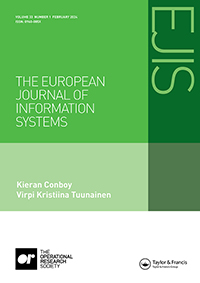Management and sustenance of digital transformations in the Irish microbusiness sector: examining the key role of microbusiness owner-manager
IF 8.6
2区 管理学
Q1 COMPUTER SCIENCE, INFORMATION SYSTEMS
引用次数: 2
Abstract
ABSTRACT Despite the economic and societal significance of microbusinesses (MBs), digital transformation (DT) efforts in the MB sector have been rather sporadic. Further, prior DT studies have primarily examined large- and mid-sized organisations, leaving a perceptible void in the literature. In this paper, we leverage the unique context of MBs and recognise the key role of microbusiness owner-managers (MBOMs) for the management and sustenance of DT initiatives. Specifically, we theorise the influence of MBOMs’ DT readiness in terms of their growth and technology mindsets contributing to their DT learning resources and processes. Drawing on qualitative data from a series of structured interviews and focus groups with MBOMs and other key stakeholders in the Irish MB digital ecosystem, we identity three MBOM digital transformer archetypes comprising unique configurations of MBOMs’ growth and technology mindsets, namely: champion digital transformers, emerging digital transformers, and aspiring digital transformers. For each of these archetypes, we explore the different learning capabilities and mechanisms through which MBOMs manage and sustain their digital transformation efforts. Our findings offer theoretical contributions to the fields of digital transformation in microbusinesses, digital leadership, and digital capabilities. Our study also has significant implications for policy and practice.爱尔兰微型企业部门数字化转型的管理和维持:审查微型企业所有者-经理的关键作用
摘要尽管微型企业具有重要的经济和社会意义,但微型企业行业的数字化转型工作却相当零散。此外,先前的DT研究主要考察了大中型组织,在文献中留下了明显的空白。在本文中,我们利用了MBs的独特背景,并认识到微企业所有者管理者(MBOM)在DT计划的管理和维持方面的关键作用。具体而言,我们从MBOM的成长和技术心态对其DT学习资源和过程的贡献角度,对其DT准备程度的影响进行了理论分析。根据对MBOM和爱尔兰MB数字生态系统中其他关键利益相关者的一系列结构化访谈和焦点小组的定性数据,我们确定了三个MBOM数字转换器原型,包括MBOM增长和技术心态的独特配置,即:冠军数字转换器、新兴数字转换器和有抱负的数字转换器。对于这些原型中的每一个,我们探索了MBOM管理和维持其数字化转型努力的不同学习能力和机制。我们的发现为微型企业的数字化转型、数字化领导力和数字化能力领域提供了理论贡献。我们的研究对政策和实践也有重要意义。
本文章由计算机程序翻译,如有差异,请以英文原文为准。
求助全文
约1分钟内获得全文
求助全文
来源期刊

European Journal of Information Systems
工程技术-计算机:信息系统
CiteScore
23.10
自引率
4.20%
发文量
52
审稿时长
>12 weeks
期刊介绍:
The European Journal of Information Systems offers a unique European perspective on the theory and practice of information systems for a global readership. We actively seek first-rate articles that offer a critical examination of information technology, covering its effects, development, implementation, strategy, management, and policy.
 求助内容:
求助内容: 应助结果提醒方式:
应助结果提醒方式:


